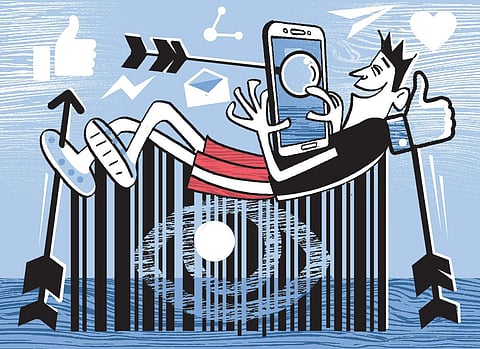

A quote from the eye-opening Netflix documentary, The Social Dilemma, goes like this: “There are only two industries that call their customers ‘users’: illegal drugs and software.” If you’re on social media, you’re a user—that’s the industry term. The association with addiction is fascinating because it is true. Just like illegal drugs (that the Indian media is currently obsessed with, but more on that later), social media is addictive. Their creators spend billions of dollars to keep you hooked on the dopamine hits of social validation—Likes, Hearts and Comments.
The longer you spend on social media, the more you see the advertisements. That’s what mints them money. As another quote from The Social Dilemma says: “If you’re not paying for the product, then you’re the product.” The biggest gift you can give someone is your attention. In reaching for social media when you’re angry, or sad or bored, you lavish that attention on Twitter or Facebook, who monetize it. Your attention, your clicks on their advertisements, that’s the product they sell to businesses. The new Facebook design is about ‘user’ experience—it is specifically geared to draw your gaze to ads at the cost of your friends’ posts. And that’s not even the most insidious thing about social media.
Over years, they’ve collected metric tonnes of data about yourself—the photographs and emotions you’ve uploaded. Using supercomputers, they’re crunching that information to figure out the sort of mood you’re in on a given day, and what your cultural, moral, and religious beliefs are. While placing an ad on social media, you’re given choices of specific demographics. For instance, you could target those who: watch romantic comedies, love baking, are single, interested in tips for better sex, have a scientific temperament. Your social media already know you better than you know yourself because they must sell you the products you want.
You’ll say that’s a good thing, right? Someone knows what I want and places it in front of me! Wrong. Someone who knows you (but does not love you) is able to manipulate and distract you, make you want things that would benefit them. Not you. They do it in minuscule increments. It is not just about the ads they curate according to what your interests and beliefs are, but also posts you’re shown from your friends or those you follow. You see different information on search engines based on your location, personalization and algorithm variations. They gradually shape your virtual reality over time.
This creates echo chambers and leads to polarisation—it is not for no reason that our politics divides us with such intensity today: from the boomers to the millennials to the GenX, everyone has turned a social-media ‘user’. As a user, you become a cult member of the reality that politicians and businesses create for you via your WhatsApp chats, your Facebook groups, Twitter hashtags. In the USA, this has created an alternative to science, which has had devastating health impacts on a populace that believes the pandemic is a myth created to oppress them with the mandatory wearing of masks.
In our country, with certain state elections approaching, you’d be forgiven if you look at your social media and imagine that our country has beaten COVID, has no border disputes and is doing well enough to focus on Bollywood stars. Whether you’re a liberal or conservative, your attention is being divided by politicians, businesses, and the media they control: your increased time online due to movement restrictions, has widened doors for them.
You’re being served gossip, strident declarations from Bollywood celebrities who receive more coverage for smashing patriarchy than the two women pilots who would be flying combat jets and helicopters for the first time in India. Drugs in the movie industry hog the headlines at the cost of news on record Covid numbers, economic downturn, fraught education, and the handing over of our agriculture, industry, and environment to capitalists.
Your social media, and the traditional media that increasingly uses it, are shaping your post-truth world—teaching you to identify with business and political interests and protect them as your own. According to Harvard Professor Shoshana Zuboff, “Social media is a marketplace that trades exclusively in human futures.” Welcome to the world of surveillance capitalism: information is power, and it is being used against you.
Damyanti Biswas
Author and activist Twitter: @damyantig